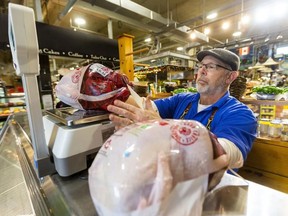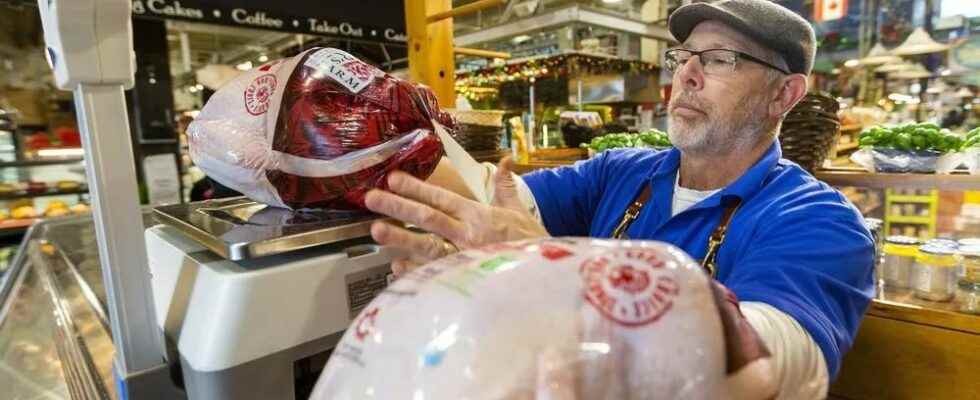
The Christmas turkey will likely make it to the holiday dinner table after all, but it will cost more to get it there.
Avian influenza, or bird flu, has hit the North American poultry industry hard, from chicken to egg producers. And that includes the turkey.
But one major turkey processor is saying there will be enough fresh birds for the festive table, although food industry analysts are reporting the price for turkey this season, as well as chicken and eggs, has increased 16 to 20 per cent.
“It is being felt in Ontario now, but it is not drastic yet. British Columbia has had more issues,” said Sean Maguire, vice-president of operations at Hayter’s Farm, a turkey processor in Dashwood.
“The market will be served. It may be more of a challenge to get to every market, there could be temporary disruptions, but it won’t be a huge shortage.”
But it will be costly. The flu combined with supply chain issues and rising cost of feed due to war in Ukraine has caused prices to spike, Maguire said.
“There is potential for a shortage, but I would not hit the panic button yet,” he said.
“The overall increase to turkey prices that the typical consumer will face is in part due to inflation and then partially due to (bird flu) in the fact that there’s not an excess amount of turkeys available that would normally be used as loss leaders for the larger retail chains.”
It is more likely the shortage will be felt here more severely through the winter and spring, with deli meat usually taken from a male turkey, called a tom, experiencing the largest increase, Maguire said.
London’s newest poultry processor, Maple Leaf Foods, recently began processing chicken at its plant here. Ontario chicken suppliers have not yet been seriously affected by the flu, as it has largely hit Western Canada, Maple Leaf said in a statement.
Nationally, more than four million birds have been culled as a direct result of avian influenza, said Sylvain Charlebois, professor in food distribution and policy at Dalhousie University.
In the spring, farm publications put the Ontario poultry cull at more than 400,000 birds.
“This will put pressure on prices for a while,” said Charlebois, agreeing turkey prices this Christmas will be 16 to 20 per cent higher than last year.
“Prices are going up, consumers may look for alternatives (to turkey). Pork is looking good right now.”
The Canadian Food Inspection Agency has been tracking and trying to confine the spread of a “highly pathogenic” H5N1 strain of avian flu that was first detected on the East Coast and surfaced on some Ontario farms, including in the London area, in the spring. The flu is spreading across the globe. Wild birds are not normally affected by the disease but can transmit it to domestic birds.
Ontario’s Ministry of Agriculture, Food and Rural Affairs says bird flu is not a threat to food safety when proper handling and cooking occur.
It also says avian influenza is not a significant public health concern for healthy people who are not in regular contact with infected birds.
Charlebois praised the Canadian Food Inspection Agency for dealing with the bird flue issue. About 17 million birds were killed in an avian flu outbreak in 2004; this year officials have kept the cull to one-quarter of that
“It has been handled well by authorities We are doing OK,” Charlebois said. “Still, these are devastating losses for farmers.”
The flu is not a threat to humans.
